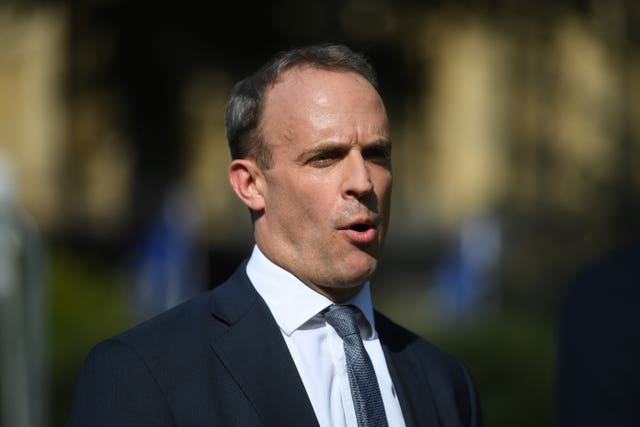
This week’s Nato summit is set to put defence spending and the future of the military alliance firmly on the election campaign agenda.
As Nato leaders head to the UK for the gathering, the PA news agency has a look at the bloc, what Donald Trump and others think of it, how much money members contribute and where the UK’s main political parties stand.
– What is Nato?
The North Atlantic Treaty Organisation was formed in 1949 to prevent a resurgence of nationalism and militarism in Europe after two world wars and to deter the Soviet Union’s expansion.
Its ranks have swelled to 29 member nations who agree to mutual defence in response to an enemy attack.
This week the UK will host @NATO Leaders’ Meeting, welcoming the Alliance back to its first home. #NATOLondon | #WeAreNATO pic.twitter.com/7RNuumVzi9
— Foreign Office 🇬🇧 (@foreignoffice) December 2, 2019
“An attack against one ally is considered as an attack against all allies,” as the principle goes.
They pledged in recent years to bring defence spending to at least 2% of each country’s GDP by 2024.
– How much does the UK spend?
The UK has met Nato’s 2% target every year since its introduction in 2006.
For the last seven years, the UK has been the second highest contributor to Nato, spending 60.4 billion dollars on defence in 2018.
The US, meanwhile, has spent more than twice as much on defence as the rest of Nato combined in each of the last seven years.
Aside from the UK and the US, the other countries meeting the 2% target are Greece, Poland, Latvia and Estonia.
Between 2012 and 2018, total Nato defence spending has fallen by 72.2 billion dollars.
– How does Donald Trump feel about Nato?
The US president has expressed concern about the cost of Nato and has been unhappy at how much the other 28 members contribute.
In his State of the Union address earlier this year, he said that the US had been “treated very unfairly by friends of ours, members of Nato” over a period of years.

During his presidential campaign he called the alliance “obsolete” and criticised other members whose security he thought was being subsidised by the States.
However, he has since u-turned on that stance, to the relief of many, saying: “I said it was obsolete. It’s no longer obsolete.”
– What about French President Emmanuel Macron?
Mr Macron has said Nato leaders must have a discussion about the future of the military alliance and how ties with Russia can be improved.
He recently described the organisation as “brain dead”, a comment that was criticised by others within the alliance.
He expressed regret at the two previous Nato summits focusing “only on how to alleviate the financial cost for the United States”, and said the bloc really needs to focus on what it is about.
– Where do Boris Johnson and the Conservative Party stand on Nato?
At the weekend, Mr Johnson said if he wins the General Election there will be a major ‘Integrated Defence, Security and Foreign Policy Review’.
He also said Nato had been the foundation of European security since 1949, adding: “We need to modernise it rather than abandon it.”

Foreign Secretary Dominic Raab said Nato remains the “cornerstone of our European security”, adding: “Nato needs to adapt to tackle new threats like cyber-attacks, as well as maintain its focus on defeating Daesh.
“But, that means all of its members paying their way, reinforcing Nato’s operational capabilities, and forging an even stronger transatlantic unity of purpose.”
– And what about the Labour Party and Liberal Democrats?
Like the Tories, Labour has committed to renewing Trident – at a cost of no less than £31 billion – and to honouring the Nato pledge of allocating 2% of GDP to defence spending.
The Lib Dems say they will build on the UK’s “proud record” of international leadership through the EU, UN, Nato and the Commonwealth by promoting values of freedom and opportunity for all.
– Where is the two-day summit taking place?
Watford. The venue for the gathering is the Grove Hotel in Chandler’s Cross on the outskirts of the Hertfordshire town.


Why are you making commenting on The National only available to subscribers?
We know there are thousands of National readers who want to debate, argue and go back and forth in the comments section of our stories. We’ve got the most informed readers in Scotland, asking each other the big questions about the future of our country.
Unfortunately, though, these important debates are being spoiled by a vocal minority of trolls who aren’t really interested in the issues, try to derail the conversations, register under fake names, and post vile abuse.
So that’s why we’ve decided to make the ability to comment only available to our paying subscribers. That way, all the trolls who post abuse on our website will have to pay if they want to join the debate – and risk a permanent ban from the account that they subscribe with.
The conversation will go back to what it should be about – people who care passionately about the issues, but disagree constructively on what we should do about them. Let’s get that debate started!
Callum Baird, Editor of The National
Comments: Our rules
We want our comments to be a lively and valuable part of our community - a place where readers can debate and engage with the most important local issues. The ability to comment on our stories is a privilege, not a right, however, and that privilege may be withdrawn if it is abused or misused.
Please report any comments that break our rules.
Read the rules here